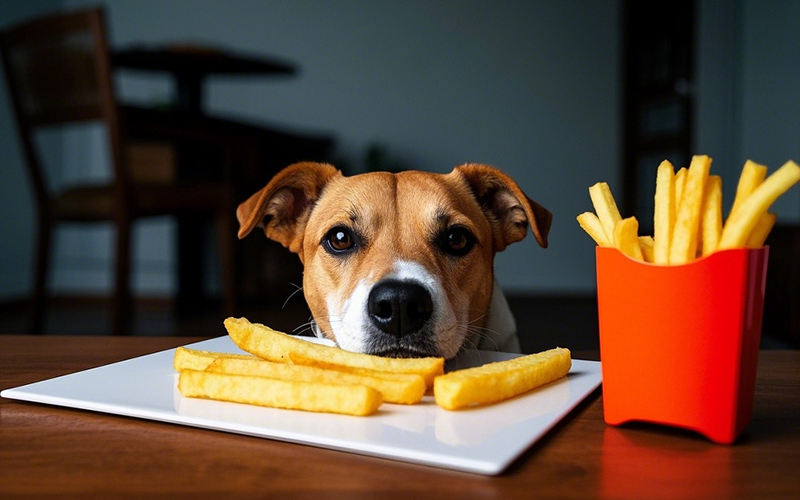Can Dogs Eat Chips? Here's What You Need to Know
- 25 Mar 2025 11:02
While chips are a popular snack for humans, they are not a good choice for dogs. While it might seem harmless to share a few with your furry friend, chips can be harmful to dogs in many ways. Let’s take a closer look at why chips should be avoided and explore healthier alternatives.

The Risks of Chips for Dogs
High in Fat
Chips are typically fried in oil, making them high in fat and calories. Eating too many fatty foods can contribute to obesity, pancreatitis, and other serious health problems in dogs. A high-fat diet can also lead to digestive distress, causing issues like vomiting or diarrhea. 🍟🐕Excessive Salt
Most chips are loaded with salt to enhance the flavor. While small amounts of salt are necessary for dogs, too much can be harmful. Excessive salt can lead to dehydration, high blood pressure, and even kidney damage. If your dog eats too many salty chips, they may experience excessive thirst, vomiting, or diarrhea. 🧂🚱Toxic Ingredients
Some types of chips, such as flavored varieties, may contain onion powder, garlic powder, or other seasonings that are toxic to dogs. Onion and garlic can cause severe damage to red blood cells and lead to anemia. These ingredients can also cause digestive upset and even long-term health problems. 🧄🧅Preservatives and Artificial Additives
Chips often contain artificial flavors, colors, and preservatives that may not be safe for dogs. These chemicals can irritate your dog’s digestive system and may cause allergic reactions or long-term health issues. 🚫
Why Chips Are Not a Healthy Snack for Dogs
While chips might seem like a tasty treat, they provide little nutritional value for dogs. Unlike fresh vegetables, fruits, or lean meats, chips are made primarily from refined carbohydrates and fatty oils, which do not contribute to your dog’s health in any meaningful way. Giving your dog chips regularly can lead to weight gain and increase the risk of diabetes, heart disease, and other health concerns. 🍔
What to Do If Your Dog Eats Chips
If your dog sneaks a chip or two, there’s no need to panic. In small amounts, one or two chips may not cause harm, but it’s important to monitor your dog for signs of digestive upset. Symptoms like vomiting, diarrhea, or excessive thirst can occur if they’ve eaten too many chips or ones with excessive salt.
If your dog consumes a large amount of chips, especially if they contain harmful ingredients like onion or garlic, it’s a good idea to contact a pet health professional right away. For fast, reliable advice, you can reach out to PettureX for a 24-hour online consultation. 📱
Healthier Alternatives to Chips for Dogs
If you’re looking for a safe snack to share with your dog, there are much healthier options that provide nutrients and flavor without the risks of chips:
Carrot Sticks
Carrots are low in calories and high in vitamins, making them a great crunchy treat for dogs. 🥕Apple Slices
Apples are packed with fiber and vitamins. Just make sure to remove the seeds and core before giving them to your dog. 🍏Sweet Potato Chews
Sweet potatoes are rich in fiber and nutrients, making them a healthy, satisfying treat. You can bake them into chewable slices for your dog. 🍠Cucumber Slices
Cucumbers are low in calories and high in water, helping with hydration while providing a refreshing crunch. 🥒
The Bottom Line: Can Dogs Eat Chips?
No, dogs should not eat chips. Chips are high in fat, salt, and potentially toxic ingredients, all of which can lead to health problems for your dog. If your dog has eaten a few chips, watch for any signs of digestive upset and consult with a pet health professional if necessary.
For healthier treat options, stick to dog-safe fruits, vegetables, and homemade snacks. If you’re ever unsure about what foods are safe for your dog, PettureX offers 24-hour online consultations to help you make informed choices for your pet's health. 🌟
Related

Crunchy Curiosity: Can Dogs Safely Snack on Pork Rinds? A Deep Dive
- 21 Apr 2025
Pomegranate Seeds and Pooches: A Deep Dive into Whether Dogs Can Safely Indulge
- 21 Apr 2025
Can Dogs Eat Peaches? Vet Explains Benefits, Cyanide Risks & Safe Serving
- 16 Apr 2025
Can Dogs Eat Mulberries? Vet Explains Safety, Benefits & Potential Risks
- 16 Apr 2025
Can Dogs Eat Mozzarella? Vet Explains the Cheesy Truth (Risks & Benefits)
- 16 Apr 2025
Can Dogs Eat Mango Skin? Vet Explains Why It's a Risky Chew!
- 16 Apr 2025
Can Dogs Eat Maple Syrup? The Sugary Truth & Why Vets Advise Against It
- 16 Apr 2025
Can Dogs Eat Mac n Cheese? Vet Explains Why This Comfort Food Is Unsafe!
- 16 Apr 2025
Can Dogs Eat Liver? Vet Guide to This Nutrient-Dense Organ Meat (Benefits & Risks!)
- 16 Apr 2025
Can Dogs Eat Lamb? Vet Insights on This Nutritious Meat Option
- 16 Apr 2025
